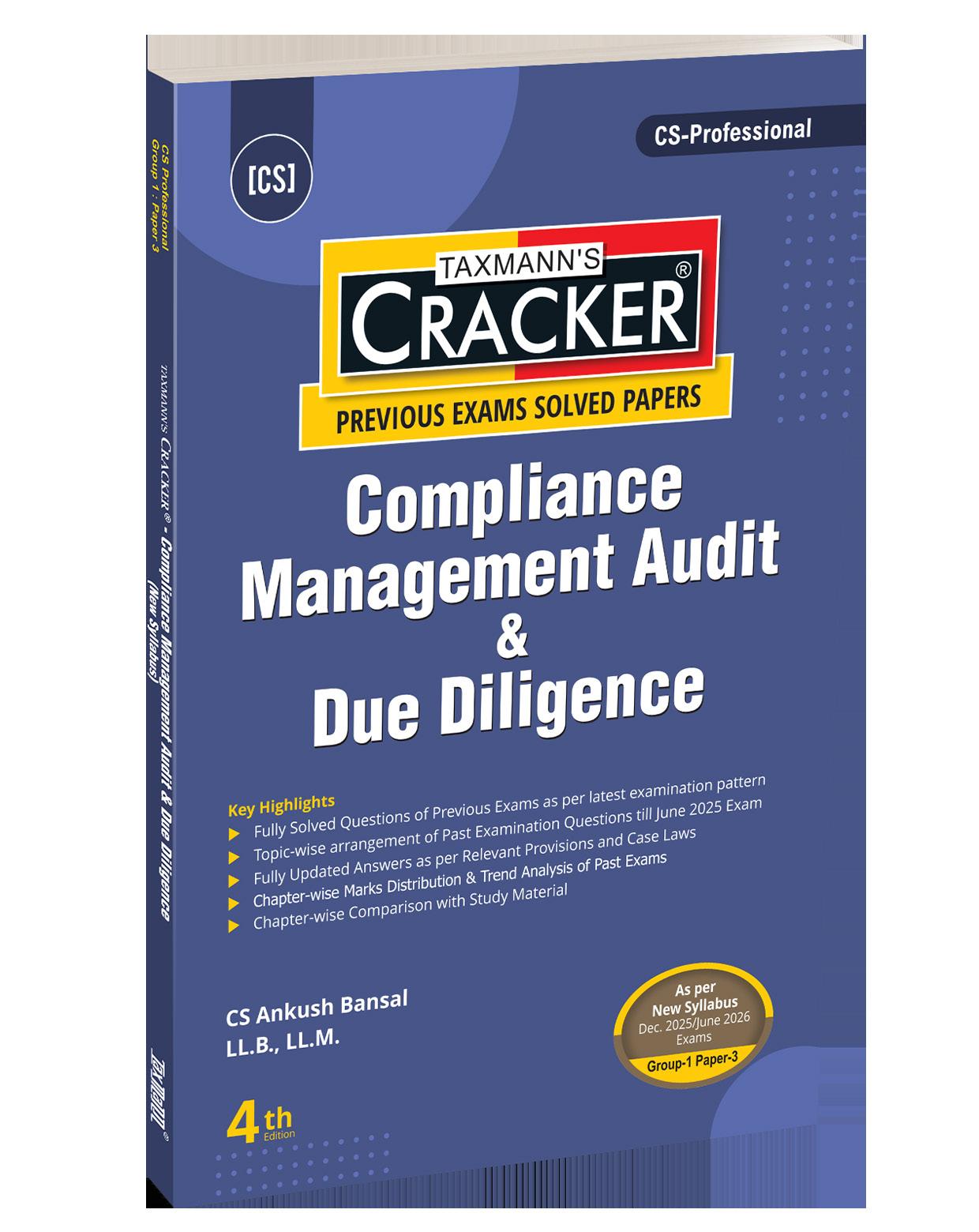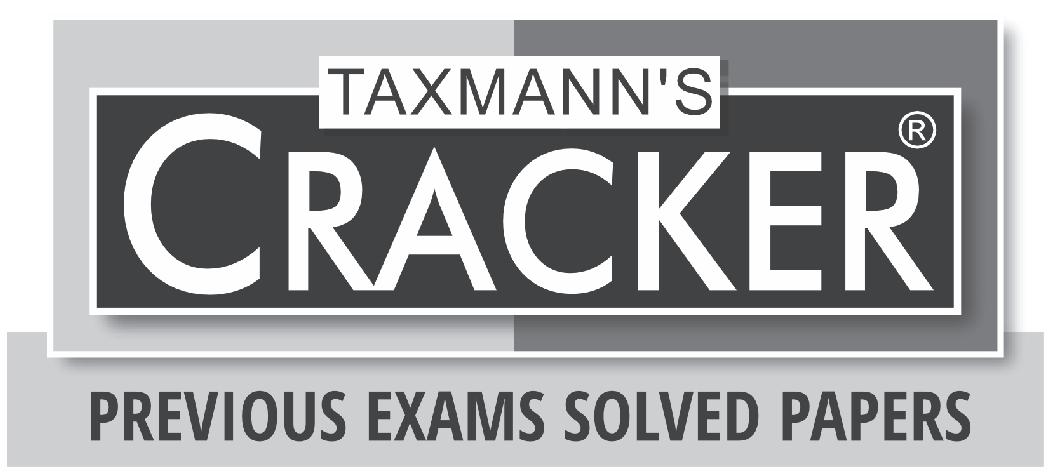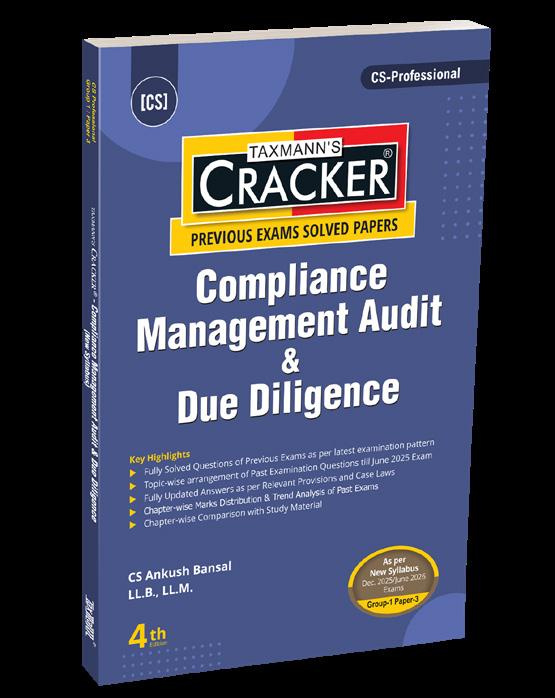










MEANING OF AUDIT ENGAGEMENT
Q1. What is the meaning of Audit Engagement? [Scoring Question]
Ans. An audit engagement is an arrangement wherein an auditor perform an audit of the transaction of the auditee for which he has been engaged by the auditee. The audit engagement is a contractual arrangement by way of the Audit Engagement letter between the auditee and the auditor.
ICSI issued CSAS-1 - Auditing Standard on Audit Engagement effective from 1st April, 2021, which defines: “Audit Engagement” means detailed terms of reference of appointment including scope of audit, remuneration and limiting conditions, if any.
Q2. A firm of Company Secretaries is to be engaged as professional experts in due diligence process. What are the preconditions of accepting the professional engagement by the firm to maintain the quality? [June 2019 (3 Marks)]
Ans. Prior to acceptance of any Audit engagement, the auditor, in order to establish whether the preconditions for accepting professional assignment are present, the auditor should check that:
a) Whether the reporting framework as required in the preparation, performance of audit, review of the secretarial/non-financial statements is acceptable; and
b) Whether the management is in agreement to acknowledge and understands its responsibility relating to:
(i) Preparation of the secretarial/non-financial statements in accordance with the applicable reporting framework, including their fair presentation;
(ii) Development of internal control/systems/procedure to enable the preparation of secretarial/non-financial statements which are free from material misstatement, whether due to fraud or error; and
(iii) Providing:
Access to all information of which management is aware that is relevant to the preparation/audit/review etc. of the secretarial/ non-financial statements such as records, documentation and other matters;
Additional information that the auditor may request from management for the relevant purpose; and
Unrestricted access to persons within the company from whom the auditor determines it necessary to obtain audit evidence.
Q3. P an auditor of SPH Ltd. had conducted the audit for the previous period and is requested to conduct the audit for subsequent period as well. The period of engagement of the audit has not expired and there are no revised terms. So, it is assumed that fresh audit engagement letter will not be required. Is it correct for the recurring audit engagement? Specify the situations when the audit engagement letter will be required. Explain the criteria for declining/ withdrawing for an audit engagement. [Dec. 2023 (5 Marks)]
Ans. (I) Other factors affecting Engagement Acceptance:
If the preconditions for an audit/professional assignment are not present , the auditor should discuss the matter with management. Unless required by law or regulation to do so, the auditor should not accept the proposed audit engagement:
(a) If the auditor assesses that the reporting framework to be applied in the preparation of the secretarial records/non-financial statements is unacceptable, or
(b) If the agreement has not been concluded.
(II) Criteria for declining and withdrawing from an Engagement:
Based on the evaluation of client information and the following factors, the auditor should determine and document the conditions beyond which it would be prudent to decline, or withdraw from an engagement:
(a) Client’s status/information that is likely to impact adversely on the independence of the firm.
(b) Ability of the firm to provide appropriate service to the client, considering needs for technical skills, knowledge of the industry and personnel.
(c) Consider circumstances which would cause the firm to regard the engagement as one requiring special attention or presenting unusual risks.
APPOINTING AUTHORITY
Q4. Discuss Appointing Authority and its types? [Scoring Question]
Ans. The appointing authority means the person who is appointing the Auditors of the company. The Auditee under the Statute could be a company or any other form of entity. Appointing Authority will depend upon the type of the Auditee.
In case the Auditee is a company, the Appointing Authority would be the Board of company or members of the company, as the case may be, as the case may be, and in other cases, it would be the persons who have been entrusted with the responsibility of governance and compliances of the Auditee. Further, the Appointing Authority may also include Court, Tribunal or Regulator or any officer thereof.
TYPES OF APPOINTING AUTHORITIES
First statutory auditor of the Company Board of Directors or members in EGM
Statutory Auditor Members in AGM
Secretarial Auditor Board of Directors
Internal Auditors Board of Directors
Auditee is under Corporate Insolvency
Resolution Process
Resolution Professional
Tribunal/ official liquidator by exercising his power Tribunal/Official Liquidator
Audit of Depository Participants
Director /Designated etc. partner depends on nature of Organisation.
Internal Audit of Stock Brokers Depends upon the type of auditee
Q5. Outline the terms and conditions typically involved in an audit engagement? [Scoring Question]
Ans. The objective and scope of every audit is dependent on the 4 corners of the terms and conditions which also include the scope of audit as agreed by and between the auditee and the auditors of the company.
This requires the specific attention of the auditors and auditee on the following points:
The objective and purpose of the audit;
The responsibilities of the auditor;
The responsibilities of management/ Auditee;
The audit risk;
The audit limitation;
The audit plans.
This is essential that the auditor as well as the auditee should agree upon the terms of audit engagement and documented the same in the audit engagement letter or other suitable form of written agreement which can be referred on any conflict arising during the course of audit.
AUDIT ENGAGEMENT PROCESS
Q6. The Board of Directors of ATP Ltd. authorized it’s one of the Directors X to appoint Secretarial Auditor of the Company. Can X do so as per the provisions of the Companies Act, 2013? Also explain pre -engagement meeting in the Audit Engagement Process. [Dec. 2022 (5 Marks)]
Ans. Section 179(3)(k) of Companies Act, 2013 read with Rule 8(4) of Companies (Meeting of Board and its Powers) Rules, 2014 requires that the Internal Auditor and Secretarial Auditor of the company shall be appointed by passing a resolution at a duly convened meeting of the Board.
Therefore, the appointment of Internal Auditor/Secretarial Auditor cannot be made by passing a resolution by circulation. Further, the said appointment cannot be made by Key Managerial Personnel or Senior Management, even if authorised by the Board in this regard.
In view of above, X cannot appoint the Secretarial Auditor of ATP Ltd. even if authorised by the Board in this regard.
Pre-Engagement Meeting:
Before accepting the Audit Engagement, the Auditor should have a preengagement meeting with the Auditee.
The meeting may inter-alia include discussion about the terms of engagement, prior year audit findings and conclusions, appropriateness of reporting framework, understanding Auditee’s business operations and environment including internal control system, commercial terms of the audit and the timelines and milestones, if any, for conducting the Audit and submission of the Audit Report. Auditor shall disclose in the pre-engagement meeting conflict of interest, if any, with the Auditee.
The Auditor shall be under Confidentiality obligation with respect to the information obtained during the pre-engagement meeting.
CONFLICT OF INTEREST
Q7. Explain the term ‘conflict of interest’ regarding audit engagement as per the Company Secretaries Auditing Standard (CSAS)-1. [Dec. 2020 (3 Marks)]
Ans.
CSAS-1 (Auditing Standard on Audit Engagement) defines: “Conflict of Interest” as: The Auditor shall not have any substantial conflict of interest with the Auditee.
Substantial Conflict of Interest means: Holding of more than 2% in the paid-up share capital or shares of nominal value of rupees fifty thousand, whichever is lower or more than 2% voting power, as the case may be, by the Auditor singly or along with partners, spouse, parent, sibling, and child of such person or of the spouse, any of whom is dependent financially on such person. Where there exists a substantial conflict of interest in the Auditee organisation, the Auditor cannot accept the Audit Engagement. The limit of holding of more than 2% in the paid-up share capital or shares of nominal value of rupees fifty thousand, whichever is lower or more than 2% voting power shall be applied based on combined holding of the Auditor along with partners, spouse, parent, sibling, and child of such person or of the spouse, any of whom is dependent financially on such person.
Q8. X, Y and Z are three partners in JK LLP, a firm of Practicing Company Secretaries. X holds 1% paid- up share capital in ABC Ltd. Y holds shares of nominal value of Rs. 70,000/- in ABC Ltd. Referring the provisions relating to ICSI Auditing Standards, advise whether JK LLP can be engaged for the Secretarial Audit of ABC Ltd. [Dec. 2020 (5 Marks)]
Ans. ICSI Auditing Standards - CSAS 1: Auditing Standards on Audit Engagement. Substantial Conflict of Interest means:
Auditor holding not more than 2% paid up share capital or shares of nominal value of Rs. 50,000 or holding not more than 2% voting power.
Auditor indebted to the Auditee for an amount not exceeding or equal to Rs. 5,00,000 indebtedness that may seriously impair the independence of the Auditor, irrespective of the amount.
Auditor was in employment of the Auditee more than 2 year ago.
In above mentioned cases, the Auditor is debarred from accepting such Audit Engagement.
In the given case, though X holds only 1% of the paid-up share capital in ABC Ltd., but according to para 3.1 of CSAS-1, he is having a substantial conflict of interest in ABC Ltd. as his partner Y is having a share capital of nominal value 70,000/- i.e., more than 50,000 in ABC Ltd. and therefore JK LLP is not eligible to become Secretarial Auditor of ABC Ltd.
Q9. J is a Practicing Company Secretary. He had taken a personal loan of Rs. 75.00.000 from LKP Ltd. He has used such loan towards purchase of his house which has been mortgaged with LKP Ltd. Due to some financial
crisis, J has not been able to repay any amount towards the loan since past 2 years. J has been offered to undertake the Secretarial Audit of LKP Lid. Can J accept the offer to undertake the Secretarial Audit of LKP Ltd.? Provide justification in support of your answer. [Dec. 2023 (3 Marks)]
Ans. As per CSAS 1, Indebtedness of the Auditor for an amount exceeding Rs. 5 lakhs other than that arising out of ordinary course of business of the Auditee.
Provided that any indebtedness that may seriously impair his independence shall also be considered as substantial conflict of interest.
Before accepting the audit, the Auditor shall disclose that there is no conflict of financial interest as specified in this standard or prescribed law under which the audit is carried on.
Conclusion: The circumstances of the case suggest that indebtedness of Mr. J towards LKP Ltd. is such that, if he accepts the Audit of LKP Ltd., it may substantially impair the independence of Mr. J while forming an opinion on the basis of his audit findings and therefore considered as substantial conflict of interest. Therefore, in this case, Mr. J shall be debarred from accepting the Secretarial Audit assignment of LKP Ltd.
CONFIDENTIALITY
Q10. XYZ Ltd. a public limited company appointed R, a practicing professional, as an Internal Auditor of the company. During its audit procedure, he came to know some material information of the company which was revealed, due to incompetency of his audit staff, to the outsiders. The company filed a suit against him stating that due to his unprofessional and irresponsible behaviour, the company has to bear a huge loss. Explain the auditor’s responsibility & duties in respect of the information acquired while performing the audit assignment. [June 2019 (5 Marks)]
OR
Q11. State the obligation of the Auditor to maintain confidentiality regarding auditee information. [Dec. 2020 (5 Marks)]
Ans. The Auditors of a company while performing the audit assignment access the various confidential information of the company and it is most required for the auditors to maintain the confidentiality of the auditee information. The principle of confidentiality imposes an obligation on the auditor to refrain from:
Disclosing information acquired as a result of professional relationships without proper and specific authority or unless there is a legal or professional right or duty to disclose; and
Using information acquired as a result of professional relationships to their personal advantage or the advantage of third parties.
An auditor should maintain confidentiality even in a social environment. The auditor should be alert to the possibility of inadvertent disclosure, particularly in circumstances involving long association with a business associate or a relative. An auditor should also maintain confidentiality of information disclosed by a prospective client or employer.
An auditor should also consider the need to maintain confidentiality of information within the firm or employing organization.
An auditor should take all reasonable steps to ensure that staff under the auditor’s control and persons from whom advice and assistance is obtained respect the auditor’s duty of confidentiality.
Q12. DEF Ltd. has to appoint the internal auditor for the financial year 202223. The company called a board meeting on 28th April, 2022 to appoint the internal auditor, but due to non-finalisation of audit firm, the Board of directors deferred the matter of appointment of internal auditor for next board meeting. Subsequently, the company has finalized the proposal of a practising Chartered Accountants firm for appointment as internal auditor. Now, in view of urgency, the directors of the company want to appoint the internal auditor by passing a resolution by circulation. Examine whether the appointment of internal auditor in this manner is permissible under the Companies Act, 2013. [June 2022 (5 Marks)]
Ans. Section 179(3)(k) of the Companies Act, 2013 read with Rule 8(4) of the Companies (Meeting of Board and its Powers) Rules, 2014 requires that the Internal Auditor of the Company shall be appointed by passing a resolution at a duly convened meeting of the Board.
Therefore, the appointment of Internal Auditor cannot be made by passing a resolution by circulation. Also, the resolution for appointment of the Internal Auditor shall be filed with the Registrar of Companies within 30 days from the passing of the said resolution pursuant to the provisions of Sections 117 & 179 of the Companies Act, 2013.
Hence, DEF Ltd. should call a Board Meeting and appoint the Internal Auditor.
Q13. Gee & Kay Ltd. has appointed Rajshekhar & Co., a Company Secretaries firm as the Secretarial Auditor for the year ended 31st March 2021. The Secretarial Audit of the company for the previous year was performed by Suryadev & Co. Is Rajshekhar & Co., required to communicate with the previous auditor before accepting such engagement? If yes, draft a letter to be addressed to the previous incumbent. [June 2021 (5 Marks)]
Ans. Yes, Rajshekhar & Co. is required to communicate with the previous auditor i.e., Suryadev & Co. before accepting such engagement. A specimen communication in this regard is given as under:
To
CS Suryadev & Co.
Address …………
Dear Sir,
Sub.: Intimation in terms of Clause 8 of the First Schedule to the Company Secretaries Act, 1980
I, CS Rajshekhar Partner, M/s. Rajshekhar & Co., a firm of Company Secretaries have been approached by the Management of M/s. Gee & Kay Ltd. to provide the secretarial audit services (list of professional services) for the FY 2021-22. vide their letter No. .......... dated ........We understand that earlier the abovementioned professional services were being rendered by your good self to Gee & Kay Ltd. during the Financial Year 2020-21.
I/We request you to kindly take this communication as an intimation to be given to the previous incumbent in terms of Clause 8 of the First Schedule to the Company Secretaries Act, 1980.
Regards,
For M/s Rajshekhar & Co.,
Firm Unique Code
CS Rajshekhar

